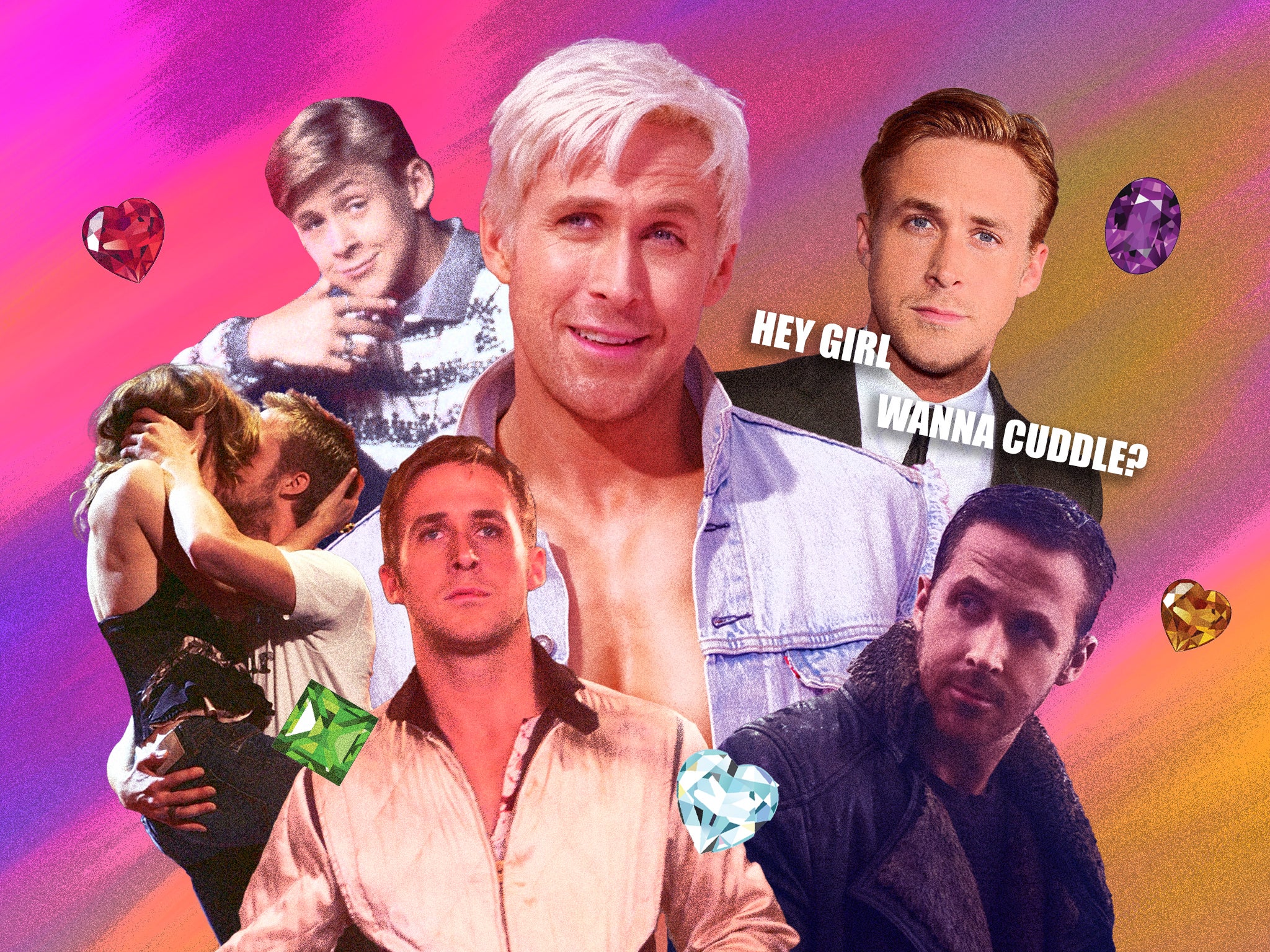Ryan Gosling has always been the ultimate internet boyfriend
The Canadian star of ‘Drive’, ‘The Gray Man’ and the forthcoming ‘Barbie’ has mirrored – and maybe predicted – cultural, societal and digital trends for much of his fame. Eloise Hendy asks what it is about the dancing, mumbling, swooning actor that makes him so damn powerful


In the summer of 2011, a video of a New York City street brawl went viral. Two guys scrappily pull each other about in the middle of an East Village crosswalk while cars try to dodge them. Bystanders either try to stop them or gawp and rubberneck. Suddenly, an insanely jacked man in a striped vest and blue cap appears. In less than two seconds, he manages to part the men with a single muscled arm. “That’s the guy from the movie,” a girl can be heard saying. At first, the girl holding the shaky phone camera is confused. “What movie?”
“The Notebook.”
Of course, it is far from the only time “the guy from The Notebook” has gone viral. It’s certainly not the only time his presence has prompted wild, hysterical screams of excitement from a crowd of girls, either. But the scene seems to encapsulate something about Ryan Gosling, the special place he holds in the public imagination and in the beating heart of the internet. The guy just makes it all seem so effortless.
Year after year and film after film, Gosling has managed to find a sweet spot in male celebrity: men want to dress like him; people who fancy men want to undress him. He’s suave and smooth but also, undeniably, a bit strange. He is the apotheosis of the “strong but sensitive” type – capable of punching someone’s lights out or cradling you in his arms like a baby (as he demonstrated with Ellen DeGeneres on her talk show in 2016, the clip of which has been watched more than 9 million times on YouTube).
Gosling can do Muay Thai and he can do the Dirty Dancing lift. He’s a lover in the body of a fighter. Look at him. The guy oozes firefighter energy – you can just tell he would throw you over his shoulder, deliver you to safety and run back into a burning building to rescue your beloved pet. Of course he would materialise on a busy street and break up a fight single-handed. Really, the only thing that could improve that street brawl scene would be if it was magically accompanied by the deep, heady beat and hazy vocals of a song from the soundtrack to Gosling’s 2011 film Drive – namely, College’s track in collaboration with Electric Youth, whose soaring, synth-laden chorus swells with the lyrics “And you have proved to be / A real human being and a real hero.”
Recently, Gosling has set the internet ablaze again with a series of photos of him in the role of Ken in the forthcoming, much-hyped Barbie movie. Despite not being scheduled for release until next summer, the film already feels like it has burrowed inside our collective consciousness like a brain-eating parasite, thanks to a steady drip release of outfit reveals and set pictures. Seriously, if you haven’t seen Gosling’s bronzed abs, Ken-branded underwear and rave-bright rollerblading fit – or heard the ear-piercing scream he lets out when Margot Robbie’s Barbie-butt gets groped on Venice Beach – then you must have thrown all your digital devices in a lake and decided to live off-grid. But, while some of the Terminally Online might feel like we’re already at Ry-Ken Gosling saturation point, studying every single image is of utmost importance.
Pay attention, people. Because the truth is that Ryan Gosling is so much more than one very attractive man. He’s a chameleon, a catalyst for change, a cultural bellwether. Somehow, his every metamorphosis and meme-inspiring moment is a masterclass on the state of modern masculinity. And if he’s undergone an internet-breaking vibe shift with the peroxide blond, perma-tanned, plastic fantastic Ken, you can bet that it points to a broader shift in contemporary culture. Let’s look at the evidence.

When Ryan Gosling first burst into La La Land from his native Canada in the early Nineties, he did it in the most manufactured-pop way possible: as an all-singing, all-dancing cheeky chappy on Disney’s Mickey Mouse Club, and the clownish co-star of Justin Timberlake, Britney Spears and Christina Aguilera. Then the new millennium hit, the “war on terror” began and pop culture lost its innocence. Xtina did “Dirrty”, Britney did “Toxic” and Gosling played a Jewish neo-nazi in The Believer (2001). Squeaky Mouseketeer clean was out. Strange little freaks were in.
Launching himself into the world of indie film, Gosling played a roster of sensitive, intelligent, anguished young men. From a high-school killer in Murder by Numbers (2002), to a lonely, nihilistic quarterback in The Slaughter Rule (2003), he seemed to gravitate towards reclusive outsiders and weirdos. Then, in 2004, just as MySpace and Facebook were ushering in a new age of social media and digital entertainment, The Notebook sent Gosling stratospheric. In Noah Calhoun, the reclusive outsider became a bona fide heartthrob.
The mid-Noughties was an era of great Hollywood romance – the epoch of Nicholas Sparks adaptations and celebrity power couples. The Notebook set the bar for heart-wrenching weepies, undoubtedly helped along by the real-life romance between Gosling and his co-star Rachel McAdams. Bennifer and Braniston may now be remembered as the golden couples of the 2000s but, back then, Ryan and Rachel were truly the moment. YouTube was founded in 2005, the same year the pair started dating, and what could possibly have been a better gift to the fledgling video-sharing platform than the pair’s acceptance of the MTV Movie Award that year for Best Kiss? With Maroon 5’s “She Will Be Loved” blaring over the speakers and Noughties stalwarts Lindsay Lohan and Hilary Duff watching stunned in the front row, Gosling lifts McAdams as easily as a loaf of bread. He grabs her hair while kissing her and secures their place in history – all while nonchalantly chewing gum.
“People do Rachel and me a disservice by assuming we were anything like the people in that movie,” Gosling later said of his Notebook fame and – by then – former flame. “Rachel and my love story is a hell of a lot more romantic than that.” How could a line like that not cement Gosling’s rightful place as the internet’s boyfriend, and spawn a thousand memes?

Of course, when I say “a thousand memes”, what I really mean is just one, almighty, all-powerful meme. What I mean is “Hey Girl”. Starting inauspiciously in early 2009 on the Tumblr blog F*** Yeah Ryan Gosling, the Hey Girl meme spiralled out of all proportion, in a persistent and enduring way that is almost unimaginable for memes today. For years, photos of Gosling asked leading questions from all corners of the internet. “Hey girl,” went one. “Is your name Google? Because you’ve got everything I’m searching for.” Initially Photoshopped fantasies of what it would be like if Ryan Gosling was your boyfriend (“Hey girl, I think we need to spend more time together, so I’ll skip the Super Bowl and craft with you”), the meme steadily mutated into something more political. “Ryan Gosling, internet boyfriend” became “Ryan Gosling, feminist theorist”. Feminism was rolling into its fourth wave and, online in Hey Girl meme form, Ryan Gosling was thinking about reproductive rights and the systematic oppression women face in the workforce. All with a twinkle in his baby blue eyes.
Yet, even as Feminist Ryan Gosling was going strong – and, according to one study, making men more feminist – the 2008 financial crash and the turmoil it brought in its wake meant a sea change was approaching. Gosling had done bleak and melancholy before, but now he turned gritty. With the taciturn, toothpick-chewing stuntman-cum-getaway-driver of Drive, Gosling burst into a new arena. The movie partly came about because Gosling and director Nicolas Winding Refn agreed that John Hughes’s Eighties romcom Sixteen Candles would have been a masterpiece if it “had a head-smashing” in it. Such a thought was fitting for a guy who was a dance competition regular as a kid, but also got suspended from first grade for throwing steak knives at his classmates after watching a Rambo movie. But, still, vocalising a desire to add violence to teen romance movies marked a turning point for Gosling: No more Mr Nice Guy. In Drive, Gangster Squad, The Place Beyond the Pines and Only God Forgives, the raw, sensitive men Gosling was known for might lurk beneath the surface, but the surface is decidedly detached, icy, and violent.

All this meant that Gosling wasn’t just hot, but cool. Men’s style magazines fell over themselves to recommend “Ryan Gosling Style Ideas”. There was Drive’s satin, scorpion-emblazoned bomber jacket; the hefty Blade Runner 2049 shearling coat. “Gosling became the pin-up boy for the bomber jacket,” fashion writer Simon Chilvers said in 2017. “That look has become a symbol for the relaxed man.” Writing about Gosling’s turn in Blade Runner 2049, critic AO Scott described the actor’s “knack for making boredom look like passion and vice versa”. It made him, Scott added, “a perfect warm-blooded robot for our time.”
But, of course, times change. We now find ourselves in what everyone seems to agree is an “unprecedented” moment. Post-pandemic, do we want warm-blooded robots any more? Do we want detachment, apathy and unruffled surfaces? Or are we after something a bit more excessive, lively and fun?
For much of the past two years, fun has been distinctly hard to come by. As the world opens up, the importance of lightness, excitement and play has been thrown into sharp relief. We’ve had enough of boredom and restraint. Now, we want abundance; we want everything all at once.
In Barbie, Gosling’s hair is bleach blonde like it was in The Place Beyond the Pines. His abs look photoshopped, like in Crazy, Stupid, Love. He has a blankly impenetrable facial expression, as in Drive. He’s even hanging out with a life-size doll, like he did in Lars and the Real Girl. As Ken, Gosling is stitched together in a Frankenstein’s monster of gloriously silly self-reference. It’s giving camp. It’s giving nostalgia. He might not be a real human being, but he could be the real hero this moment needs. Come on Barbie, let’s go party.
Join our commenting forum
Join thought-provoking conversations, follow other Independent readers and see their replies
Comments


Bookmark popover
Removed from bookmarks